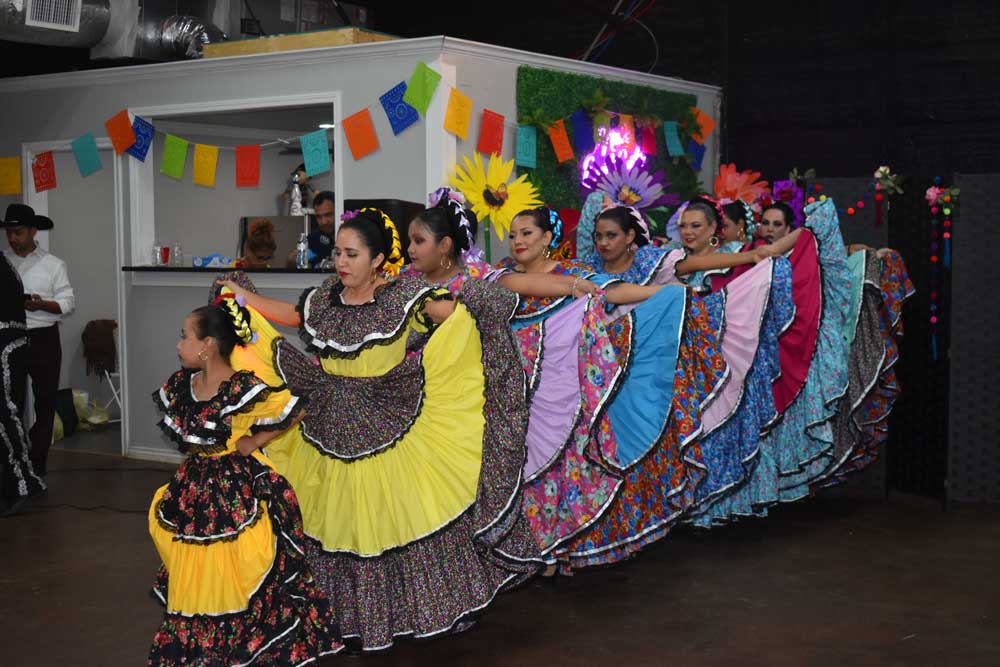Tyler nonprofit showcases ballet folklorico and celebrates Mexican culture
Published 5:40 am Monday, October 21, 2024

- Los vestidos de vivos colores que lucen las bailarinas en la Rose City Fiesta están inspirados en los trajes tradicionales de Sinaloa, México. (Raquel Villatoro/ Tyler Morning Telegraph)
For years Tyler resident Carmen Delgadillo waited for a ballet folklorico group to be a part of. On Friday, Oct. 11 she danced as part of the ballet folklorico Monarcas from Tyler nonprofit Monarca Initiative as their newest member.
Before joining the group, Delgadillo danced with another group. She has been dancing for three years. When she heard about the ballet folklorico group through Monarca Initiative, she reached out to Monarca Initiative co-founder Josefina Vazquez about joining the group. That same week she immediately started rehearsing.
Trending
“From there, I started and never missed a week (of practice),” Delgadillo said. “I am here consistently. (I’m) happy to finally have this concluded. Now that it’s all together — the group — in my first presentation/performance, imagine, (I feel) very proud and excited.”
The night of Monarca Initiative’s Flavors and Folklore event, Delgadillo held out an eyeshadow palette and applied her makeup ahead of her first dance as part of the group. She wore her hair up with red ribbons peeking through along with a white long-sleeve blouse and a long red skirt. The red and white outfit is representative of Nuevo León, one of 31 states in Mexico, which is located in Northern Mexico and borders Laredo.
Ballet folklorico dances are specific to regions. Each region in Mexico has their own dances. For this dance from Nuevo León, the women wore white boots and held red fans while the men wore black hats, brown jackets with tassels and red bandanas on their necks.
In addition, ballet folklorico Monarcas performed dances from Sinaloa. In brightly colored dresses, dancers rapidly move the skirt of their dresses.
Attendees gathered in support to watch ballet folklorico and support Tyler nonprofit Monarca Initiative in their efforts to fund their group. In addition, La Voz Gemela del Portillo sang songs in Spanish.
“Today we gather to celebrate our culture, our traditions and most importantly our community,” said Cecilia Cuellar, who introduced the group during the event. “All of you, those of you here, are the most important part of Monarca, the heart and soul.”
Trending
The funds collected from the event will help pay for the dance instructor and outfits so they can continue dancing and sharing the art of ballet folklorico.
For Elsa Muñoz, 44, originally from San Luis Potosí, Mexico, being part of the group means being able to continue maintaining her roots in the United States.
“It’s cool to have this opportunity being outside of the country to be able to keep your traditions so you don’t forget them,” Muñoz said.
Muñoz joined the group because of her sister and performed for the first time with the group. Although she felt nervous, she was excited. As a kid, she loved dancing. “It’s like therapy,” she said.
Myriam Cerecer, Monarca Initiative board member and member of ballet folklorico Monarcas, was proud of the group’s performance. Although many of them have jobs and children, they never missed practice.
The ballet folklorico Monarcas formed in February in order to perform at Monarca Initiative’s kickoff celebration on April 26. The group started out with six women and has grown to include seven women, two men and two girls.
“It was due to emotion, because of emotion we wanted to demonstrate dance and demonstrate our roots,” Cerecer said.
For Cerecer, who has been dancing since she was two, ballet folklorico was her first love. “It remains my first love,” Cerecer said. “It is my passion. I love it.”
Cerecer hopes more men join the group because many dances are done in pairs. Ballet folklorico is also for men and boys, she added.
Tyler resident Melissa Russell, originally from Querétaro, Mexico, is excited to see another ballet folklorico group in East Texas. She enjoys events like these where Mexican culture can be celebrated especially when Mexican Independence Day comes around.
“I am not in Mexico to celebrate but I can do it here too in a smaller way,” Russell said. “I still have these roots to keep celebrating these dates.”
For more information on Monarca Initiative, visit https://www.monarcainitiative.org/.






